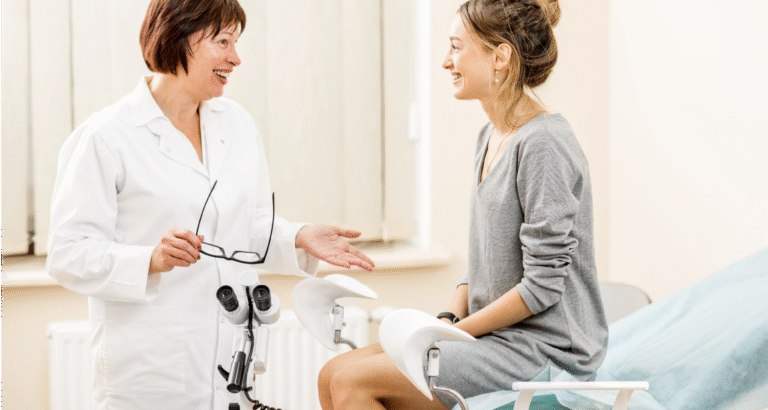At ESSE Care, we frequently get asked whether women in menopause, perimenopause, or postmenopause still need to have annual gynecologic exams, especially after undergoing a hysterectomy. Many women have heard from friends or even read new guidelines suggesting they may no longer need regular exams. Unfortunately, this can lead to confusion and misconceptions about what’s best for long-term gynecologic health.
In this blog, we’ll address this important question: Do you still need to see your gynecologist after menopause or a hysterectomy?
Why Annual Gynecologic Exams Are Still Important
Some newer recommendations and swab tests may lead women to believe that traditional pelvic exams are no longer necessary, especially once they have entered menopause or had a hysterectomy. While it is true that pap smears and cervical cancer screenings may become less frequent, a pelvic exam remains an essential tool for maintaining gynecologic health.
Here’s why:
- Screening for Gynecologic Cancers: Even if you’ve had a hysterectomy, especially if it was only a partial one (leaving the ovaries or cervix intact), you remain at risk for ovarian cancer, vaginal cancer, and other reproductive organ issues. Early detection is key, and a pelvic exam can help identify concerning signs before symptoms arise.
- Detection of Pelvic Floor Disorders: Postmenopausal women are more prone to conditions like pelvic organ prolapse, urinary incontinence, and atrophic vaginitis. Regular exams help your gynecologist catch these conditions early when treatment can be more effective.
- Vaginal Health and Hormonal Changes: Hormonal shifts during menopause can cause changes in vaginal and vulvar health, including dryness, thinning tissues, and irritation. A pelvic exam ensures that these issues are identified and managed appropriately, whether with topical treatments, hormone therapy, or lifestyle changes
Did you know that chronic bladder irritation or UTI symptoms can be caused by lack of estrogen or declining vaginal estrogen?
A pelvic exam allows your doctor to assess whether vaginal estrogen could benefit your urinary function and support vaginal tissue health. Both hormonal and non-hormonal options are available for consideration. Learn more.
Common Misconceptions About Post-Menopause Gynecologic Health
There’s a belief circulating among some healthcare sources and conversations at cocktail parties that menopausal women no longer need pelvic exams because they’re “out of the woods” in terms of gynecologic risks. Unfortunately, this isn’t entirely true. While pap smears and certain tests might be recommended less often as you age, your gynecologist can still identify important health issues that might go unnoticed without an exam.
For instance:
- Ovarian Cancer: Often called the “silent killer” because it presents few symptoms until later stages, ovarian cancer remains a significant risk. Routine pelvic exams may pick up on subtle signs that something is amiss.
- Post-Hysterectomy Needs: Even women who’ve had a hysterectomy (whether full or partial) should still be evaluated. This is especially true for those who kept their ovaries or cervix, as those tissues can still develop health problems like cancer or endometriosis-related complications.
What Happens During a Gynecologic Exam After Menopause?
Your annual exam post-menopause or post-hysterectomy might look a little different from what you were used to before, but it remains just as important. Here’s what to expect:
- Speculum Exam: Your doctor will insert a speculum into the vagina to examine the vaginal walls, cervix (if present), and other tissues for abnormalities. This helps identify any issues related to vaginal atrophy, lesions, or infections.
- Bimanual Exam: During this part of the exam, your gynecologist uses one hand on the abdomen and the other inside the vagina to feel the pelvic organs. This allows them to assess the size, shape, and position of the ovaries, uterus (if intact), and check for any masses or tenderness.
- Discussion of Symptoms: This is your chance to bring up any concerns or symptoms you may be experiencing—whether it’s urinary issues, vaginal dryness, or sexual health concerns. Many postmenopausal women are unsure whether what they are feeling is “normal,” but this conversation can help put your mind at ease or lead to solutions that improve your quality of life.
Frequently Asked Questions About Menopausal and Post-Hysterectomy Exams
1. I’ve had a hysterectomy. Do I still need pelvic exams?
Yes, especially if you still have your ovaries or cervix. Even without those organs, pelvic exams are important for monitoring vaginal health, screening for cancer, and detecting pelvic floor issues.
2. If I’m not sexually active anymore, do I still need an exam?
Absolutely. Your sexual activity doesn’t determine your need for an exam. Postmenopausal changes can affect vaginal and urinary health, whether or not you’re sexually active.
3. What if I no longer need pap smears? Do I still need to see my gynecologist?
Yes! Pap smears are just one aspect of gynecologic care. Even if you don’t need regular cervical screenings, pelvic exams provide a way to catch other potential issues like prolapse, vaginal cancer, or ovarian problems.
4. How often should I see my gynecologist after menopause?
It’s typically recommended to see your gynecologist annually unless otherwise directed by your healthcare provider. However, if you experience new symptoms like unusual bleeding, pelvic pain, or changes in bladder or bowel function, don’t wait for your annual exam to seek care.
The Bottom Line: Don’t Skip Your Gynecologic Exams!
As gynecologists, we understand that menopause and post-hysterectomy life bring many changes. But no matter what stage of life you’re in, it’s important to keep up with your gynecologic health. Annual exams provide a chance to catch problems early, ensure your reproductive system is functioning well, and improve your overall well-being.
At ESSE Care, we prioritize your health at every stage of life. If you haven’t had a pelvic exam in a while, or if you’re unsure about whether you need one, reach out to schedule an appointment today. Our compassionate team is here to help keep you healthy and address any concerns you may have.












